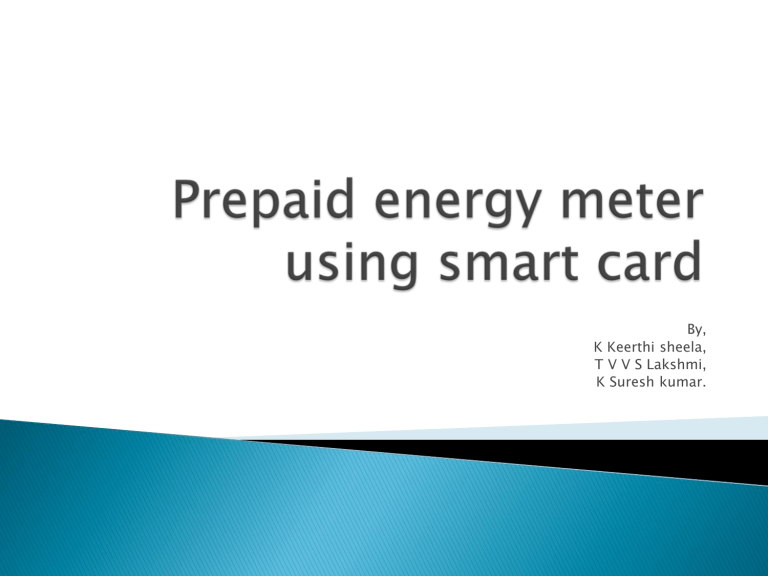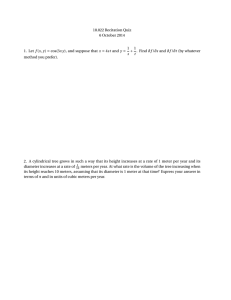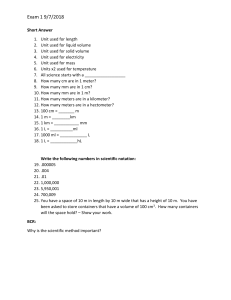
By, K Keerthi sheela, T V V S Lakshmi, K Suresh kumar. An energy meter is a device that measures the amount of electrical energy consumed by a residence, business, or an electrically powered device. Electric meters are typically calibrated in billing units, the most common one being the kilowatt hour. A scheme of Electricity billing system called “PREPAID ENERGY METER WITH TARIFF INDICATOR” can facilitate in improved cash flow management in energy utilities and can reduces problem associated with billing consumer living in isolated area and reduces deployment of manpower for taking meter readings. Every consumer can buy a memory card (is nothing but an EEPROM IC) with a password stored inside it using a MC program The card reader will read the stored information and delete the information from the EEPROM IC(smart card) using the MC program,so that the smart card cannot be reused by others. In our project we also have a provision to give an alarm sound to consumer before the whole amount is reduced. The meter consists of a microcontroller, a current feedback section consisting of a current transformer, a signal conditioning circuit & adc. A prepaid smart card containing a serial number & amount has to be inserted into the meter. This project uses regulated 5v, 500ma power supply. 7805 and 7812 three terminal voltage regulators are used for voltage regulation. Bridge type full wave rectifier is used to rectify the ac output of secondary of 230/12v step down transformer. The conventional electro-mechanical meters are being replaced with electronic meters to improve accuracy in meter reading. Asian countries are currently looking to introduce prepaid electricity meters across their distribution network, buoyed up by the success of this novel methodology in South Africa. The existing inherent problems with the post-paid system and privatization of state held power distribution companies are the major driving factors for this market in Asia. Over 40 countries have implemented prepaid meters in their markets. . The prepaid program in South Africa was started in 1992, since then they have installed over 6 million meters. The concept has found ground in Argentina and New Zealand with few thousands of installations. Improved operational efficiencies: The prepaid meters are likely to cut the cost of meter reading as no meter readers are required. In addition, they eliminate administrative hassles associated with disconnection and reconnection. Besides, going by South Africa’s experience, prepaid meters could help control appropriation of electricity in a better way than conventional meters. Reduced financial risks: Since the payment is up-front, it reduces the financial risk by improving the cash flows and necessitates an improved revenue management system. Better customer service: The system eliminates billing delay, removes cost involved in disconnection/reconnection, enables controlled use of energy, and helps customers to save money through better energy management. Power sector reforms: The upcoming competitive and customer focused deregulated power distribution market will force the market participants to make the existing metering and billing process more competent. This is likely to drive the prepaid market. Increasing non-technical losses: Metering errors, tampering with meters leading to low registration and calibration related frauds are some of the key components of non-technical losses. India reports greater than 10 percent of non-technical losses. It has been reported that prepaid meters control non-technical losses better than conventional ones. Opportunities in the emerging electrifying markets: Most of the Asian countries do not have 100 percent electrification; hence new markets are being created by the increasing generating capacity. Prepaid systems can be more easily introduced in such new markets rather than the existing ones. The Sabah Electricity Sdn Bhd (SESB), Malaysia, has awarded a contract to a local manufacturer to supply 1,080 prepaid meters Countries such as Thailand, Bangladesh, Singapore, and Iran have been showing increased interest in adopting prepaid system In India, the State of West Bengal has decided to introduce the smart card operated prepaid energy meters in remote islands of Sunderbans. In Mumbai, pre-paid power is provided by the Brihanmumbai Electricity Supply and Transport (BEST) Undertaking.Tata Power plans to introduce pre-paid electricity in Delhi. Tata Steel is likely to install prepaid electricity meters at its employee township in Jamshedpur.




